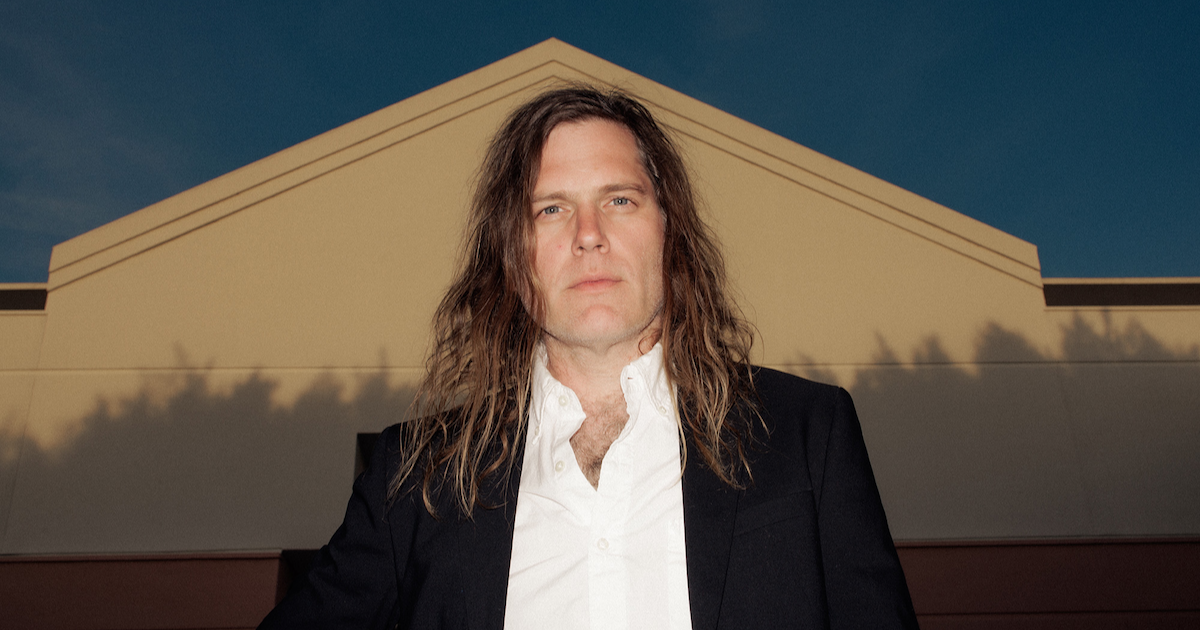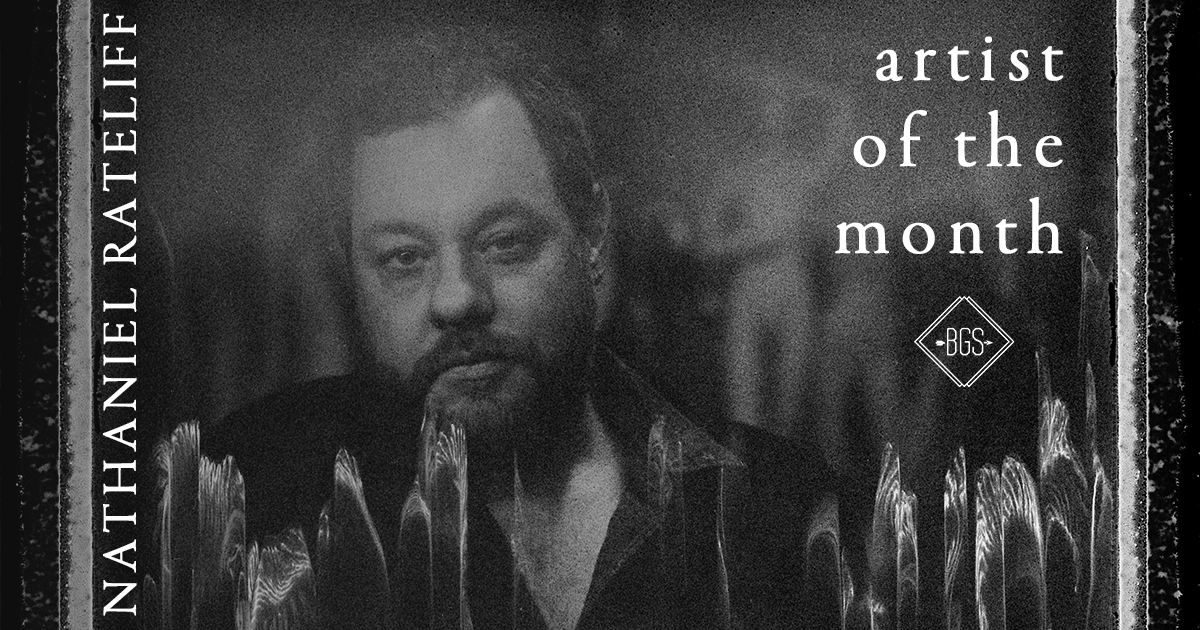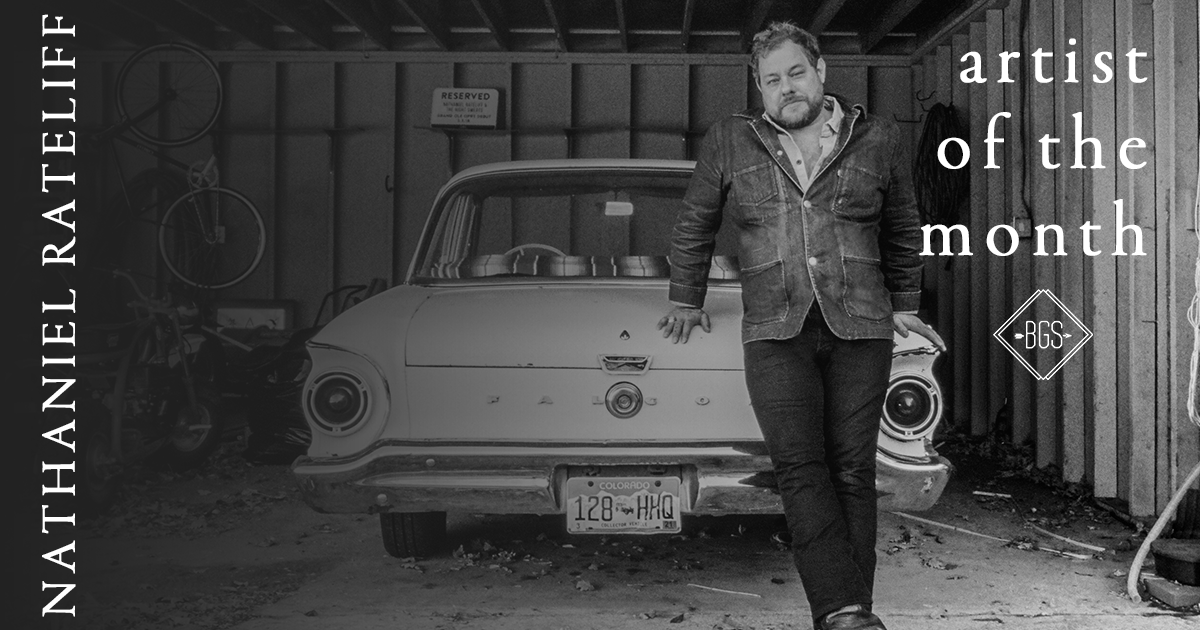The road less traveled is always the road most traveled by singer-songwriter Eric D. Johnson, better known under the performing name of Fruit Bats. Johnson thrives in a world of creative dichotomy: he loves deadlines as much as he cherishes random twists and turns in his process.
He’s been making music this way for years, since time spent on the Chicago music scene, through his days with Califone, The Shins, and the creation and continuation of Fruit Bats. There’s also Bonny Light Horseman, the indie trio where he partners with renowned musicians and songwriters Josh Kaufman and Anaïs Mitchell. Their most recent album, Keep Me on Your Mind/See You Free, was released last year.
Johnson’s latest Fruit Bats project is Baby Man, a full-length album recorded earlier this year with longtime producer and friend Thom Monahan. The album is a reunion of sorts, after Johnson self-produced 2023’s A River Running To Your Heart.
Baby Man, which is his voice, guitar, piano, and little else, was an unexpected project – another deviation from original blueprint onto the less-traveled road. And one that called for Monahan’s expertise and sonic touch. The outcome, says Johnson, is “intimate and yet big. There wasn’t a lot of fuss over arrangements. Everything you hear came out of my hands or mouth earlier that day or the day before.”
It was early morning on the West Coast when Eric D. Johnson settled in to speak with BGS. “This is my second interview on this,” he noted about Baby Man, “so you’re hearing me work this out in real time in my brain.”
You have detailed this many times: iPhone voice memos, demoing, writing, the studio as a writing tool. You like a deadline, you like mistakes, you like left turns. Was this album true to method?
Eric D. Johnson: Yes. This was the leftiest of all left turns you could possibly take, because the original plan was a very lo-fi hair-metal covers album. [It was] basically a midterm project between album cycles.
During the pandemic I had done this full album cover of Smashing Pumpkins’ Siamese Dream. I had no real expectation for it other than a pandemic exercise/fun sort of bedroom thing and it hit a little bit. Everything I do is ambitious in some way, but this was a “throw something at the wall” idea originally and not a big deal.
I was talking to Thom Monahan, my producer/mentor. We hadn’t worked together in a few albums, although we’re still dear friends. I always talk to him before I make something, which is like, “What microphone do I put on this?” I’m asking all these questions, we ended up chatting for an hour and by the end of the conversation I was like, “I think you should do this record.”
This was all over the course of a very short amount of time in February. I started writing songs and I realized I was starting to do what I do, which is write a diary. Most of my records, songwriter-wise, are what’s happening now.
This record turned into something that was me and Thom working for probably a week and a half. It wasn’t a mandate I laid down, but the whole record was written and recorded in that space, which I almost never do. It’s usually fragments of things I’ve been putting together from notebooks or demos or sketches that are a year or more than a year old. So everything you hear is a week in the life.
When we delivered it to the record label [Merge], again thinking it was a midterm project, they were like, “This is really good. This is a real album.” So the hair-metal covers record will happen someday, but instead you get Baby Man.
How has your working relationship with Thom grown and developed?
If I had a breakthrough album, it’s probably Gold Past Life [2019], which was my last thing with Thom before this. I think that was us at the height of our language with each other in some ways.
I’ve learned everything from him. When we were first starting to work together, on Tripper [2011], I was just learning how to use Pro Tools and how to use the studio as a tool for writing. I would make demos and Thom would come in with a blowtorch on them, because I didn’t really know what I was doing yet.
We made a couple more records, and by the time you hear the stuff on Absolute Loser [2016] and Gold Past Life, if you went back and listened to the original demos, they’re surprisingly not that different. That’s Thom trusting me more, being like, “This sounds pretty good.” Obviously he adds an incredible boost to them. There are songs on that record, too, where Thom completely dismantled them and was like, “This sucks,” because he’s not afraid to tell me he thinks something sucks. Which is good. You need the extra pair of ears. So we kind of have a shared mind when we’re working together.
What have you learned from Thom that applies to your own production work? For example, Sarah Klang’s Beautiful Woman album.
I don’t do tons of it, but when I produce other artists, it comes from that demoing process I learned from Thom, where you go from skeleton of song, to demo, to studio project, to finished product. With Sarah, we worked together as writers first. When you write with me, and this has happened a couple times, we’re making demos and we realize, “We’re making a record now.”
That was what happened with Sarah. It was very similar to what Thom and I do together, which is me building a demo and then giving it to him. But in this case, you build a demo, you keep building it, go into a nice, big studio, and all that. So that was what that was about. It started off as a writing session and it snowballed into a record.
You’re taking Baby Man on the road. Alone. Could you strip it down any more than that?
It’s terrifying. I have no idea what to expect. Fruit Bats concerts have become big, rollicking rock shows. The audiences have grown and people have a good time. I think of it as a very intimate experience, but as much as we’re in the folk-rock realm, they’re big rock shows.
I’m nervous about this. I’ve obviously played solo shows, and I think I know how to do it, but there is a certain contract you have to have with the audience for that. You can’t just close your eyes and push through it. You have an extra responsibility to connect.
I’m always concerned with that, and not in a bad way. But if I’m playing to 1800 people, in my mind I still want to make eye contact with every single one of them, even though I know that’s not possible. So with the solo show, where it’s a little more intimate, you probably are going to make eye contact with however many people are there. It’s going to be very exposing and I don’t know what to expect.
You’ve said before that Fruit Bats is half your life and each album is like a chapter, a piece of an autobiography. Which chapter is this?
This chapter is … I am hesitant to say midlife, because I don’t know. My cliché answer is, “I’ve gotten better at making myself understood, but I care less about ma king myself understood.” When you’re a younger writer, you’re like, “You don’t get this!” Now I’m like, “You’ll get it, or if you don’t, that’s cool.”
I think I’m writing really well now. The very early Fruit Bats records are enigmatic because I didn’t know how to write yet. I came from indie rock. I came from Pavement. I loved Stephen Malkmus, and he wasn’t writing about feelings. And I had played in Califone, and those are impressionistic lyrics, very visual, so I was doing that.
When I accidentally wrote a love song with “When U Love Somebody” [Mouthfuls], in 2003, it kind of hit. I was never emo. Even though I’m from the emo generation and from Illinois, where all the emo dudes came from, I wasn’t doing emo. Maybe this is my emo period, I guess you could say. With Baby Man, there is that kind of feel. I’m writing some pretty direct stuff, but I still have my impressionistic side that gets smeared in.
Where does Bonny Light Horseman fit into that?
My work with them is not unlike my work with Thom, which is to say, it’s been an education. Josh Kaufman, as a producer, has been influential on my production and the way I approach albums, too, because he’s totally different from Thom.
Of course Anaïs, as a writer, has had a massive effect on me because she’s meticulous. She makes you be like, “What did you mean by this line?” So I’ve learned writing from her, and production and writing from Josh because he writes as well. Like with everything, you take things from it as you move along. I’m definitely “the guy in a band” in that band, the professional guy in a band.
On “Creature From The Wild,” you address pet loss and grief, which is too often met with “Just get another one,” as if the can opener stopped working, so just buy a replacement. Tell us about Pinto and the song.
Pinto was my first dog and, obviously, once you get a dog, the joys, the familiarity of it, and the relationship is really special. And Pinto was a unique dog. He was sort of a person, sort of a cat, but also a dog.
You raise pets and it’s such a foolish endeavor for us; it’s such a horrible thing that we do to ourselves, because we raise them like our children, but they have a lifespan of 15 years and so you have to understand that. You’re right – some people are like, “Get another one,” but I do think a lot of people get it, if they get it.
That was a song I wrote completely while on a run, into a voice memo, at about 10 a.m. The recording you hear is at 1 p.m., three hours later. The notion that they save you, the “for a while” part, is that these love relationships are destined to be fleeting.
I also wanted to write directly about him. He was a Mexican street dog, so I wanted to write a hero story and think of him as a little heroic hobo and it was a little bit of a hero’s journey for him. I was just trying to write what I know. It’s a love song. Grief really is love. My publicist Colette and I had a Zoom call over it and we both cried.
A portion of sales from the track and pre-orders are going to the Baja Street Dogs rescue.
Yeah. Pinto was a Baja street dog, not from that rescue, but there’s tons down there. This guy, this rescue, is like a shepherd. He has a flock of dogs. He rescues so many; the breadth of his work is really impressive. It’s his life’s work, which is fascinating to see somebody do something like that.
We have a lot of big problems in the world right now, which I totally get, and there’s probably bigger fish to fry in some ways than rescuing dogs. But there’s a certain eye-level universality to loving a dog, for me. They help us. There’s always the cliché of “We don’t deserve dogs.” And I’m like, “Fuck no, we don’t.”
You have spoken about music and mental health in the past. You’ve said that while you find your music riddled with anxiety, people say they find it comforting.
In the press materials, quoting, “Again and again, Baby Man sees Johnson ask a central question: Is any of this worth it? The album is the answer, a resounding ‘yes.’” But some of the lyrics … in “Let You People Down, ” it’s “days that I’ve wished that I cease to exist.”
I can say, with all honesty, that’s not suicidal ideation I’m writing about necessarily, even though it sounds like it might be butting up right against that and I’m trying to speak to it. If someone wanted to take that as that, I would allow it, but that’s not… my other publicist, Jim, really loved the record, but his first question was, “Are you okay?”
I’ve lost friends who ended their lives – Neal Casal and Richard Swift, who died from alcohol. In many ways it was a slow suicide, when you drink yourself to death in that way. So it’s some big, grownup shit, but that specific line isn’t about that per se. It’s “This world is hard.” It’s more like, “I wish I’d never been born,” but that’s not a direct nod to ending one’s life, either. It’s about the burden of living, which, like I said, certainly could butt up against something like that. I’ll let people take what they want from it. It’s a song about wanting to love and be loved.
Then there’s “That’s why I’m trying so hard not to die.” [“Moon’s Too Bright”]
Yeah. Again, the line, “I’ve never been good with goodbyes,” and death is the biggest goodbye, so I’m not singing about killing oneself. I’m saying, “Wouldn’t it be sad to leave? Isn’t it sad to leave? Isn’t it sad to say goodbye?”
I’ve always written a little bit about this stuff, but usually there’s a disco beat, which I love. I love the happy/sad nexus, like “A Lingering Love” [Gold Past Life], which has become this kind of pop hit. It’s really sad, but it’s got the “Dancing Queen” beat behind it. It’s the total cliché of “I’m laying myself bare lyrically.” I always have, but I think because of the production, you’re hearing it more.
I’m not afraid to answer you on those [questions], nor am I denying that I’m talking about some pretty heavy stuff in there. People can hear what they want to hear from it, but the central song of the record in some ways is “Baby Man,” which is some sort of Buddhist notion where I wasn’t alive before 1976. I was gone. I was dead before 1976. “Where were you during the Renaissance?” Those types of questions. “Baby Man” is this cyclical kind of Buddhist song – not to get too heady about it.
So my sad stuff always has an undercurrent of hope, and this record there’s a little bit of that in there, too. But the hope is sometimes buoyed by disco beats, and this one doesn’t have that.
Let’s end on a high note with a lightning round on a topic that comes up in many of your interviews: The Beatles. A Beatles song that always makes you feel good.
Ooh, this is real lightning round! I’m circling back on early Beatles, so “Please Please Me.” I probably would’ve said a Paul song from the White Album, if you’d asked me that not long ago, but I’m into older Beatles. Smash Hits has been my jam lately.
Most underrated Beatles album.
Is there an underrated one? Once again, I’ll say probably the early ones, like Help, but I don’t know if there’s an underrated one, because people who don’t like The Beatles will say they’re overrated, so you can’t say there’s an underrated one, but probably the early ones. Let’s say Help.
Beatles album you most would have liked to be a fly on the wall in the studio while they recorded it.
I probably would’ve said Let It Be, but then we got to be with that movie, which was one of the most astounding pieces of documentary filmmaking I’ve ever seen in my life. I couldn’t believe it. It was like finding the Dead Sea Scrolls. So I’m going to say White Album, because that’s the one that sounds the most like four solo records and I know it was a really fraught process, too. For a long time, in high school and stuff, that was my most influential Beatles record, so I’m going to say White Album.
The throughline from bluegrass to The Beatles.
Oh, that’s easy! A lot of people don’t realize how young bluegrass is of a genre, but the throughline from early American folk and country music to early rock and roll to The Beatles seems pretty simple to me – bluegrass obviously being its own little split-off in the 1950s… not to get all ethnomusicology on it!
Photo Credit: Chantal Anderson


